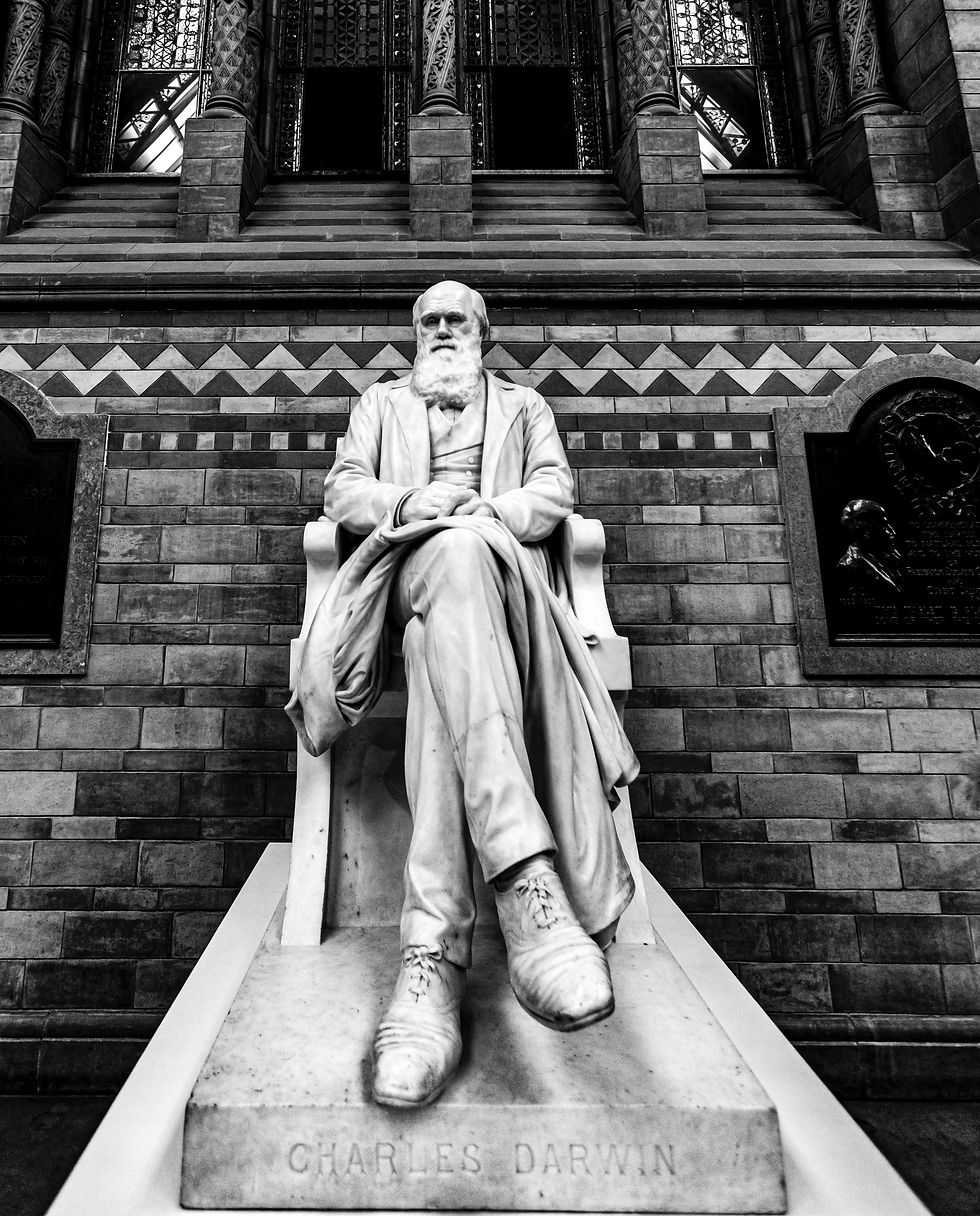Evolution vs creationism: on the question of origin
- sandra aisien

- Aug 28, 2022
- 6 min read
Updated: Dec 31, 2024
“This most beautiful system of the sun, planets, and comets, could only proceed from the counsel and dominion of an intelligent Being" - Sir Isaac Newton.

Photo credit: Hulki Okan Tabak/ Unsplash
Based on the presumption that there is no alternative comprehensible explanation for how the universe came to be, Darwin's theory of evolution by natural selection is taught in schools all around the world as a scientific fact.
Atheists assert that they do not believe in God because it is impossible to establish His existence. Although this statement is valid, no one can refute the existence of God. Examining the available data is the only logical approach to this discussion.
According to cosmologists, the Big Bang, an event that occurred around 13.8 billion years ago, is what caused the universe to start. But how long can this hypothesis be sustained?
Darwin's 1859 book The Origin of Species using Natural Selection, suggests that species can change over time in subtle ways, leading a population to alter size or color throughout several generations—this is known as "microevolution." As a consequence, everything has a common ancestor. Natural selection also asserts that new species might be created given enough time and cumulative modifications; this idea is referred to as "macroevolution," according to which dinosaurs could evolve into birds and apes into humans.
Darwin stated that the origin of all living things was from a single, simple organism that multiplied and gradually changed over time into the complex life forms we see today. For this reason, he coined the Latin phrase "Natura non facit saltar" (nature does not jump), which was also used by Gottfried Leibniz and Kant. However, no one has ever been able to show how life sprang from inanimate objects.
Because no animal has ever transformed from one type to another and because life has never been artificially generated in a laboratory, scientists are at a loss for an explanation. Therefore, there is no evidence to suggest that God did not create life.
Darwinists have been claiming for the past 150 years that God is not necessary to explain why people exist and that evolution takes the place of God, willfully forgetting that evolution only explains what happens after there is life. As a result, they have never provided an answer to the most fundamental question of all time: where did life as we know it originate?
In his book, "The Grand Design," atheist theoretical physicist Stephen Hawking attempts to provide a solution. He writes:
Because there is a law such as gravity, the universe will create itself from nothing; spontaneous creation is the reason there is something instead of nothing, that’s why the universe exists, why we exist. It is not necessary to invoke God to set things in motion.
In response, John Lennox, an Oxford University professor of mathematics and physics, showed that three logical contradictions are all the result of circular reasoning, a logical fallacy in which the speaker begins with the idea they hope to end with. He said this in response:
Nonsense remains nonsense even when spoken by famous scientists
Hawking's "genius" claim is essentially meaningless because all he did was reiterate his initial claim without actually explaining how the world came to be. Therefore, Professor Lennox's refutation makes sense.
The rationale and significance of creationism
Let's look at creationism as a counterargument to evolution without confirming or rejecting the validity of the hypothesis.

Most Christians adhere to the biblical narrative of the how and why of the genesis of life; I say "most" Christians because there are "Christians" who think that God employed evolution in the process; they are also known as progressive creationists or theistic evolutionists. But creation is not scientific since it cannot be witnessed, explained, or replicated scientifically, contravening the basic concept of science, which states that: Photo credit: Brett Jordan/ Unsplash.
It is the systematic, evidence-based pursuit and application of knowledge and understanding of the natural and social worlds. Among these approaches are unbiased observation, proof, experimentation, and/or observation as standards for evaluating hypotheses, repetition, critical analysis, and verification.
A straightforward illustration could help to clarify the situation: even though none of us were present, we can all agree that Abraham Lincoln served as the 16th president of the United States of America. This is a perfect example of historical truth, as historical data backs up the idea that Abraham Lincoln served as US president at some point in time.
The universe we live in, the grandeur and intricacy of everything around us, are ideal proof of an intelligent mind. If you apply the same logic to the Bible, you will discover that this is the foundation of the creationist concept.
Genesis 1:1: "In the beginning, God created the Heavens and the Earth"
Famous scientist and philosopher Hebert Spencer is credited with coining the phrase "survival of the fittest" in his Principles of Biology (1864) after reading Darwin's On the Origin of Species:
This survival of the fittest, which I have here sought to express in mechanical terms, is that which Mr. Darwin has called "natural selection," or the preservation of favored races in the struggle for life.
Herbert Spencer's Principles of Biology of 1864, vol. 1, p. 444

According to Spencer, "everything that exists in the universe can be divided into five categories: time, force, action, space, and matter—a logical progression that confirms the biblical truth found in Genesis 1:1, where time refers to "in the beginning," the force is "God," the action is "created," the heavens are the place where it all began, and the matter is unmistakably "earth."
Nothing + nothing cannot equal everything since it is illogical, according to common sense. Millions of individuals seem to have no trouble embracing evolutionary ideas as the only "logical explanation" for how life first began, even though there is little to no evidence to support these beliefs. Photo credit: Robert Koorenny/ Unsplash
That the evolution idea removes moral duty and accountability is among its harshest implications. As excellently stated by Erich Fromm, recent history demonstrates how the foundation of Adolf Hitler's horrifying crime against mankind was based on evolution theory:
The religion of social Darwinism belongs to the most dangerous elements within the thoughts of the last century. It aids the propagation of ruthless national and racial egoism by establishing it as a moral norm. If Hitler believed in anything at all, then it was in the laws of evolution that justified and sanctified his actions and especially his cruelties.
Where rationality stands
Job is a book of the Bible that challenges one man's vain understanding of God. In his limited and finite comprehension, he questions the authority of God, and he is reprimanded.
Then the Lord answered Job out of the whirlwind and said: Who is this that darkens counsel by words without knowledge? ...“Where were you when I laid the foundation of the earth? Tell me if you understand. Who determined its measurements—surely you know! Or who stretched the line upon it? On what were its bases sunk, or who laid its cornerstone, when the morning stars sang together and all the sons of God shouted for joy? “Have you commanded the morning since your days be, and caused the dawn to know its place... (Job 38, ESV)
Other than the latter being illogical, evolution differs from creation in that it eliminates the option to believe in the God who created the universe. There is no meaningful justification for morality without God. As sinners, we desire the abolition of moral responsibility brought about by evolution since, left to our own devices, we are unable and unwilling to pursue God.
Preacher, author, and educator Voddie Baucham is the dean of theology at African Christian University in Lusaka, Zambia. He is also a pastor. In one of his sermons on why the Bible is adequate and why he believes it, he said the following. He is one of the most significant and reliable voices in the search for biblical truth and apologetics.
I choose to believe the Bible because it is a reliable collection of historical documents written by eyewitnesses during the lifetime of other eyewitnesses. They report supernatural events that took place in fulfillment of specific prophecies, and they claim to be divine rather than human in origin.
Every part of life, including how we live our lives and the decisions we make, depends on the issue of origin. If you believe in evolution, life has no purpose, there is no one we must account for, there is no afterlife, and there is no heaven or hell.
Nothing—certainly not the universe—happens by chance.
Deeper investigation and exploration



Comments